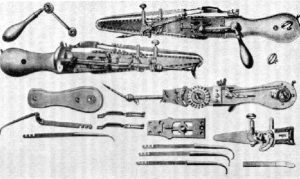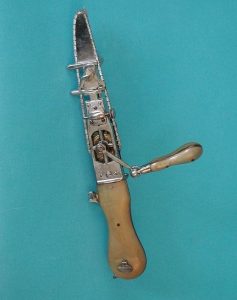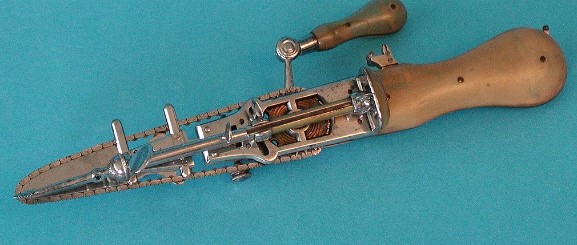Why Chainsaws Invented? Chainsaws are an invention that most of us take for granted. But have you ever stopped to ask why they were developed in the first place?
In this blog post, we will explore the history of the chainsaw and why it created. We will also look at how the tool used during childbirth.
The chainsaw is one of the most iconic tools in the world. In this blog post, we will explore the history of the chainsaw and find out how it used during childbirth and by Scottish surgeons.
Table of Contents
Were chainsaws invented for childbirth?
Have you ever wondered why chainsaws are so prominent? They’re not the tool you would want to use for delicate tasks.
It turns out that chainsaws invented for a very different purpose – childbirth. Believe it or not, chainsaws can be incredibly helpful for delivering a baby.
They can be up to 10 times faster than a normal birth. So next time you see a chainsaw, don’t be so quick to judge. It might just have saved somebody’s life.

Chainsaws are a standard tool uses by many people for various purposes. Some people believe that this is true, and there is some evidence to support this claim. Keep reading to learn more about the history of chainsaws and their possible origins.
It is believed that chainsaws invented in the early 1800s by two Scottish surgeons named John Aitken and James Jeffray. They are looking for a way to speed up the delivery of babies.
Additionally, experimented with many different tools, but none of them proved effective. That is until he came across the chainsaw.
They found that the chainsaw could speed up the delivery process by ten times. That was a huge breakthrough at the time, and it quickly became the preferred method of childbirth for many surgeons.
The Childbirth Problem
It’s no secret that childbirth is a dangerous and potentially deadly event. Every year, thousands of women die in childbirth or from complications related to it.
In the developed world, where medical care is readily available, the maternal mortality is still around 14 deaths per 100,000 live births.
However, where access to high-quality medical care is restricted in many countries around the world, the maternal mortality rate is far higher, at about 200 deaths per 100,000 live births.

One of the significant problems with childbirth is that it often takes place in remote and rural areas, far from any medical help. It was especially true in the early days of chainsaw development.
In those days, if a woman went into labor in the middle of the night, she might have to wait hours or even days for a doctor or midwife to arrive. This delay could often be the difference between life and death for both the mother and child.
The other problem with childbirth is that it is an incredibly messy and bloody affair. That was also true in the early days of chainsaw development.
In those days, if a woman went into labor, she would often cover in blood and gore when the doctor or midwife arrived. That made it very difficult for them to properly assess the situation and provide the necessary medical care.
Scottish surgeons John Aitken and James Jeffray developed the chainsaw to solve these problems. They believed that using a chainsaw could speed up the delivery process and make it less messy and bloody.
Additionally, they hoped that the chainsaw would be able to reach women in remote and rural areas more quickly and efficiently.
The first recorded use of the chainsaw in childbirth was in 1813. A woman named Janet Birthistle went into labor in the middle of the night, far from any medical help.
Her husband, John, decided to try and deliver the baby himself. He had no experience with childbirth, but he had heard about the new chainsaw technique.
John was able to successfully deliver the baby using the chainsaw. Janet and the baby were both healthy and did not suffer any complications. This was a breakthrough at the time, and it quickly led to other surgeons adopting the technique.
Why chainsaws invented?
When you think of chainsaws, what comes to mind? Most likely, you think of the powerful machines used for cutting down trees.
But do you know why they invented in the first place? It turns out that chainsaws designed for a much different purpose – childbirth.
Let’s look at how chainsaws became an essential tool for childbirth and why they’re still used today. Chainsaws invented to help with delivery.
Before chainsaws were developed, women often died from beginning because there was not enough medical technology to help them.
Chainsaws allowed doctors to cut through the birth canal quickly and easily, which helped save many lives.
While it’s incredible that chainsaws invented for such a vital purpose, it’s also important to remember that they’re hazardous machines.
So if you’re ever around one, use caution and follow all safety protocols. Chainsaws have played a significant role in saving lives – both in the past and present.
Evolution of the chainsaw
The chainsaw invented by two Scottish surgeons, John Aitken and James Jeffray, in the early 1800s. At the time, most childbirths took place at home with the help of a midwife. However, there were still many cases where women died during childbirth due to complications.
In 1806, James Young performed an emergency Caesarean section on a woman about to die in childbirth. He used a small, hand-held saw to cut through the bone and tissue of the birth canal. That saved the woman’s life and marked the first time a chainsaw used in childbirth.
While this was a breakthrough, it would still be many years before chainsaws became a common tool for childbirth. In the early days, chainsaws were very large and unwieldy, making them difficult to use in emergencies.
It wasn’t until the mid-1900s that chainsaws began to use more frequently for childbirth. This was due to advances in medical technology that made the machines smaller and easier to use. By the late 20th century, chainsaws were an essential tool for many obstetricians and midwives.
While chainsaws have come a long way since they were first invented, they’re still very dangerous machines. Every year, there are thousands of accidents involving chainsaws. So be sure to use caution and follow all safety protocols if you’re ever around one.
Despite the risks, chainsaws have played a vital role in saving lives. They continue to be an essential tool for many obstetricians and midwives and are likely to remain so for many years to come.
Chainsaws are a vital tool for many obstetricians and midwives. They continue to be an essential tool for many obstetricians and midwives and are likely to remain so for many years to come.
These are vital for many obstetricians and midwives because they allow doctors to quickly and easily cut through the birth canal. This can often be the difference between life and death for both the mother and child.
While chainsaws are very dangerous machines, it’s clear that they have played a major role in saving lives – both in the past and present. So if you’re ever around one, use caution and follow all safety protocols.
Final Words
A chainsaw is a versatile tool that has a long and interesting history. The chainsaw, which is now most often associated with logging and forestry, originally developed for a very different purpose: childbirth.
The chainsaw first used in the early 1900s to chop down trees. The first recorded use of a chainsaw in childbirth was in 1933.








